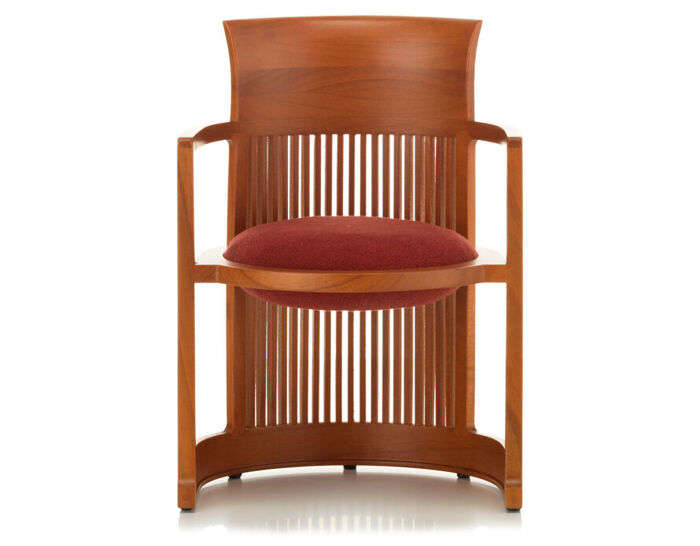Miniature FLW Barrel Chair
from Vitra. - Sale
miniature flw barrel chair
Design Frank Lloyd Wright, 1904
1/6 miniature scale model
Made in Poland by Vitra
For over two decades, the Vitra Design Museum has been making miniature replicas of milestones in furniture design. The Miniatures Collection encapsulates the entire history of industrial furniture design - moving from Historicism and Art Nouveau to the New Objectivity of Bauhaus and Radical Design, and from Postmodernism all the way up to the present day. Exactly one sixth of the size of the historical originals, the chairs are all true to scale and precisely recreate the smallest details of construction, material and color. The high standard of authenticity even extends to the natural grain of the wood, the reproduction of screws and the elaborate handicraft techniques involved. This has made the miniatures into popular collector's items as well as ideal illustrative material for universities, design schools and architects.
Originally designed by Frank Lloyd Wright in 1904 for the D. D. Martin House in Buffalo, New York, this iconic chair was an embarkation from his earlier linear furniture designs, due to its round shape.
Original features included a flared backrest, square spindle supports and a cushioned double-sided circular seat. In 1937, Frank Lloyd Wright re-created the Barrel Chair design in a larger version with other design modifications for the residence of Herbert F. Johnson, known as Wingspread, to accommodate the expansive rooms and towering ceiling heights.
Each Vitra miniature is true to the original in construction and materials, and reduced in size on a scale of 1:6. Each miniature is packaged in a wooden box, accompanied by an informational booklet. Production notes: Each of the delicate objects are made by hand; on average, each miniature requires five hours of careful manual work. Ongoing quality control ensures that every miniature corresponds to its larger original in terms of finishing, details and materials.
5.5" h | 3.9" w | 3.9" d
1/6 miniature scale model
Made in Poland by Vitra
For over two decades, the Vitra Design Museum has been making miniature replicas of milestones in furniture design. The Miniatures Collection encapsulates the entire history of industrial furniture design - moving from Historicism and Art Nouveau to the New Objectivity of Bauhaus and Radical Design, and from Postmodernism all the way up to the present day. Exactly one sixth of the size of the historical originals, the chairs are all true to scale and precisely recreate the smallest details of construction, material and color. The high standard of authenticity even extends to the natural grain of the wood, the reproduction of screws and the elaborate handicraft techniques involved. This has made the miniatures into popular collector's items as well as ideal illustrative material for universities, design schools and architects.
Originally designed by Frank Lloyd Wright in 1904 for the D. D. Martin House in Buffalo, New York, this iconic chair was an embarkation from his earlier linear furniture designs, due to its round shape.
Original features included a flared backrest, square spindle supports and a cushioned double-sided circular seat. In 1937, Frank Lloyd Wright re-created the Barrel Chair design in a larger version with other design modifications for the residence of Herbert F. Johnson, known as Wingspread, to accommodate the expansive rooms and towering ceiling heights.
Each Vitra miniature is true to the original in construction and materials, and reduced in size on a scale of 1:6. Each miniature is packaged in a wooden box, accompanied by an informational booklet. Production notes: Each of the delicate objects are made by hand; on average, each miniature requires five hours of careful manual work. Ongoing quality control ensures that every miniature corresponds to its larger original in terms of finishing, details and materials.
5.5" h | 3.9" w | 3.9" d
Vitra is a Swiss company dedicated to improving the quality of life through the power of design. A central goal of Vitra is sustainable development. Trendy styling is avoided in favor of classic pieces that can be used for decades.











 write a review now
write a review now